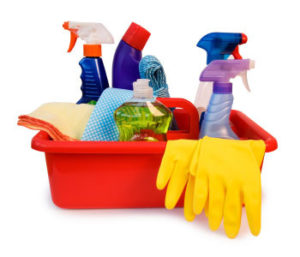
Selection of Cleaning Products
Cleaning is an essential activity. By its nature, cleaning involves removing physical contaminants and disinfecting, and therefore the use of chemicals for which we currently have limited knowledge about their effects on IAQ and on health. Given our incomplete knowledge, the goal is then to strive for a balance between effectiveness, effect on indoor air quality, labour and cost. There is no definitive list of cleaning products that maximize cleaning effectiveness while minimizing substances that can adversely affect indoor air quality. Table 3-2 (page 8) provides general information about attributes and ingredients. It is recopied from the U.S. Environmental Protection Agency (EPA) and is only an example of the type of information that is available. It should be used with discretion, as the terms “Preferred attributes” and “Preferred ingredients” are relative. Where custodial services are done under contract, the terms should specify the desired attributes of cleaning products.
Measuring/Diluting Concentrated Cleaning Products
Highly-concentrated cleaning products must be handled, stored and mixed (diluted) according to manufacturers’ directions. This can be achieved through a variety of methods including measuring cups, simple dispensing pumps and more complicated automatic dilution equipment. Follow these recommendations:
• Clearly post mixing instructions in janitors’ rooms;
• Use appropriate protective equipment when mixing concentrated cleaning products;
• Follow manufacturer’s dilution directions – do not under- or over-dilute concentrated cleaning products;
• Make sure secondary containers have appropriate label; and
• Never mix different cleaning products together.
Cleaning personnel should understand that adding extra concentrated cleaning product does not make it work better or faster. It wastes products and can also result in longer times to do a job (i.e., removing residues), slippery floors and surfaces, accumulations of chemical residues and other complications. The residue of most cleaning products attracts and retains dirt and may cause skin irritation and respiratory distress in some people.
Storage of Cleaning Products
The storage of cleaning products in well-designed and ventilated janitorial closets is an important aspect of an overall strategy to minimize IAQ impacts resulting from cleaning and maintenance. Provision of hot water taps and adequate mop sinks, proper dispensing systems for stock cleaning agents, moisture- resistant flooring materials, posted instructions for the preparation of cleaning agents, and protocols in well-located closets will assist in the delivery of improved cleaning services.
See references in section 9 for additional sources of information.
Janitorial Equipment
Vacuum cleaners should be equipped with a high-efficiency particulate air (HEPA) filtration system capable of trapping 99.97% (>0.3 μm) of all airborne particles collected by the vacuum.
Smoking Areas
Smoking areas should be located away from building entrances and away from ventilation intakes. It is important to provide clear signage for both designated smoking areas and areas where smoking is not permitted. Consult local bylaws for required distances. Information about smoking areas is available from:
Canadian Centre for Occupational Health and Safety (http://www.ccohs.ca/oshanswers/psychosocial/ ets_resolutions.html)
More information on cleaning products and IAQ can be found in Module 3.
